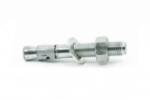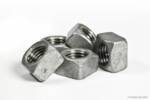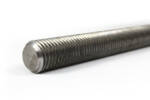Tag Archives: ASTM
Straightness Tolerances for F1554
Are there straightness tolerances for ASTM F1554 anchor bolts?The answer to this question is no. The ASTM F1554 specification defines tolerance ranges for various dimensional requirements such as thread dimensions, thread length variance, overall length, (and in the case of bent anchor bolts) bend section, hook length, and bend length. However, no tolerances are given for straightness. The reason for this is because... Read more
Hot-Dip Galvanizing Specifications
Does ASTM A123 apply to bolts and fasteners as a galvanizing specification?ASTM A123 does not cover threaded bolts and fasteners. ASTM A153 and F2329 are the ASTM specifications that cover the requirements for hot-dip zinc coating of fasteners. ASTM A123 This specification covers the requirements for hot-dip galvanizing on iron and steel products made from rolled pressed and forged shapes, castings, plates, bars, and strips. It... Read more
Ordering Bolts to ASTM A588
Can I order bolts to A588?ASTM A588 is a common steel standard that covers high strength, low-alloy structural steel shapes, plates, and bars with improved atmospheric corrosion resistance that is intended for riveted, bolted, or welded construction. Fasteners are not specifically included in the scope of A588, but that doesn’t stop engineers and contractors from asking for A588 bolts. Why is... Read more
Ordering Bolts to A572 Grade 50
Can I order bolts to A572 Grade 50?ASTM A572 is a common structural steel standard that covers five grades (42, 50, 55, 60, 65) of high strength, low-alloy structural steel shapes, plates, and bars that is intended for riveted, bolted, or welded construction. Fasteners are not specifically included in the scope of A572, but that doesn’t stop engineers and contractors from asking for... Read more
Ordering Bolts to ASTM A36
Can I order bolts to ASTM A36?ASTM A36 is a very common steel standard that covers structural carbon steel shapes, plates and bars. Fasteners are not specifically included in the scope of A36, but that doesn’t stop engineers and contractors from asking for A36 bolts. Why is that an issue? The inherent problem with trying to order bolts to a ASTM... Read more
F844 Standard Washer Certifications
Do ASTM F844 standard flat washers come with certification documents?Commercially available ASTM F844 washers are typically not accompanied by certification documents, even though the F844 washers supplied by Portland Bolt are domestically manufactured. The reason mill test reports are not available for F844 washers is that there are no specific chemical or mechanical (strength, hardness) requirements for these washers. The only requirement is that they need... Read more

F1554 and Wedge Anchors
Does the F1554 specification cover wedge anchors?No. The ASTM F1554 specification clearly addresses the type of bolts that are covered under this specification, and which types of fasteners are not. ASTM F1554 Section 1.1 states that F1554 covers “…straight and bent, headed and headless, carbon boron, alloy or high strength low-alloy steel anchor bolt (also known as anchor rods).” Additionally, in... Read more
Headed F1554 Anchor Bolts
Do headed F1554 anchor bolts have a standard hex head or a heavy hex head?ASTM F1554 does not specify whether the headed configuration is to be a standard hex pattern or heavy hex. There are three primary configurations covered by the ASTM F1554 specification which include straight rods, bent anchor bolts, and forged headed anchor bolts. Whether or not a headed anchor has a standard hex head or a heavy hex head can differ depending on the application. Since the... Read more
ROCAP Testing for A490 Structural Bolts
Does the ASTM Require a Rotational Capacity Test for A490 Structural Bolts?No, ASTM does not require a rotational capacity test for A490 structural bolts. The reason for this is that the purpose of the rotational capacity test per ASTM is to evaluate the presence and efficiency of the lubricant used in a bolt and nut combination. Lubrication is used with galvanized bolts since there is additional... Read more
Stacking Washers with A325 Bolts
Is stacking of F436 washers acceptable with an A325 bolted connection?Yes, in some cases the stacking of F436 washers seems to be allowed, but not in all cases. The Research Council on Structural Connections (RCSC) in Specification for Structural Joints Using High-Strength Bolts, December 31, 2009, page 16.2-12 says, “If necessary, the next increment of bolt length can be specified with ASTM F436 washers in... Read more

Galvanized Nuts and Plain Bolts
Can I use a hot-dip galvanized nut on a plain finish bolt?Hot-dip galvanized nuts cannot be used on a plain finish bolt. Hot-dip galvanizing adds between 2 – 6 mils (.002” – .006”) of zinc to the threads of the bolt and due to this increased thread thickness, hot-dip galvanized nuts are tapped oversize to accommodate and create a workable fit. These oversized internal threads on... Read more
Bolt Length Tolerance
What is the length tolerance for a bolt?ASME B18.2.1 has a table that deals with the length tolerance for square, hex, heavy hex, and askew head bolts. It also has a section for lag screws as well as tighter tolerance cap screws. The tolerance varies greatly per diameter and length of the fastener. See the table below. ASTM A325 and A490 heavy... Read more
Welding Beveled Washers
Can I weld to your malleable beveled washers?Along with shear plates and round malleable washers, malleable beveled washers are made with ASTM A47 cast malleable iron. See the following excerpts from ASTM A47. 11.3 Castings that have been repaired by the welding shall be reannealed so that the microstructure will comply with Section 8. (Section 8 of ASTM A47 lays out specific... Read more

Torque Charts and Anchor Bolts
Do torque charts for tensioning fasteners apply to anchor bolts?The AISC Steel Construction Manual, 13th Edition has this to say about anchor rod nut installation. “The majority of anchorage applications in buildings do not require special anchor rod nut installation procedures or pretension in the anchor rod. The anchor rod nuts should be “drawn down tight” as columns and bases are erected. This condition... Read more
A307 Grade 36 vs F1554 Grade 36
Can the anchor bolts type ASTM F1554 grade 36 be replaced with ASTM A307 grade 36?This question was submitted by a Port Authority on the East Coast. Anchor bolts were supplied by another company claiming they met or exceeded the requirements of F1554 grade 36. As it turns out, they did not. Hi Greg, Sorry for being late to send you a clear copy of the Mill certification. Just to... Read more

Grade 5 or A449 vs F1554 Grade 55
Can I substitute Grade 5 or A449 bolts for F1554 grade 55 bolts?In most circumstances the answer is no. For Grade 5 the answer is never. Although, Grade 5 meets the minimum yield requirements of F1554gr55, the minimum tensile requirements exceed the maximum tensile requirements in all cases. A449 is similar in regards to meeting the minimum yield strength of F1554 Grade 55 across the board but... Read more
Fastener Substitution Liability
What are the liability issues involved in substituting one fastener grade or configuration for another?Have you ever had a fastener company try to talk you into substituting A193 grade B7 all thread rod for F1554 grade 55 anchor rods, claiming it’s “better”? Have you allowed them to substitute an all thread rod with a nut tack welded in lieu of a headed bolt? These are scenarios that come up... Read more

A307 Grade A vs F1554 Grade 36
Will imported A307 grade A hex bolts meet the requirements of F1554 grade 36?Anchor bolts which are embedded in concrete and used for structural anchorage purposes can assume several forms. Common forms of anchor bolts include right angle bend anchor bolts, swedged rods, and threaded rods (typically with a nut and/or square plate attached to the bottom of the rod). Another common configuration for an anchor bolt is... Read more
Rolled vs Cut Thread Bolts
What is the difference between a bolt with rolled threads and one with cut threads and does a fastener with a reduced body and rolled threads meet ASTM specifications?Threads of a mechanical fastener, regardless of whether it is a headed bolt, rod, or bent bolt, can be produced by either cutting or rolling. The differences, misconceptions, advantages, and disadvantages of each method are described below. Rolled Threads Roll threading is a process by which steel is extruded to form the threaded portion of... Read more

F1554 Grade 36 All Thread Rod
Does commercially available mild steel all thread rod meet ASTM F1554 grade 36?In almost all cases, commercially available all thread rod will not meet F1554 grade 36. First, it is rare that distributors or manufacturers keep lot control on all thread rod. In other words, different heats of all thread rod are commingled so that it is difficult to determine the exact certification document that corresponds to... Read more
Large Diameter SAE Bolts
Are SAE Grade 2, 5, and 8 bolts available in diameters over 1½"?No, the SAE J429 specification only covers bolts up to and including 1½” diameter. SAE J429 (1999), the specification that includes Grade 2, 5, and 8 fasteners, states: “This SAE standard covers the mechanical and material requirements for inch-series steel bolts, screws, studs, SEMS, and U-bolts used for automotive and related industries in sizes to... Read more
Washers for Structural Bolts
Are washers required to be used with an A325 or A490 structural bolt?It is known that the required grade of washer to be used with an A325 or A490 structural bolt is an ASTM F436 hardened washer, however whether or not a washer is required to be used in a given application is often brought into question. The purpose of using a flat washer with a bolt... Read more
F1554 Grade 55 vs A307 Grade C
My plans call for an A307 grade C anchor bolt and my supplier is offering F1554 grade 55 anchor bolts as a substitution. Is this acceptable?Theoretically, this substitution makes sense. However, one should always check with the project engineer before making any alterations to the grade or configuration of product that has been specified for the structure. Please note that for liability reasons, Portland Bolt is not recommending that this substitution be made without appropriate approval. The A307 grade A... Read more
Fully Threaded ASTM A325 Bolts
Can Portland Bolt manufacture a 1" x 6" fully threaded A325 heavy hex structural bolt?Bolts manufactured to the ASTM A325 specification have a fixed thread length for a given diameter, which is often shorter than other grades of bolts. For example, a 3/4″ diameter A325 has 1-3/8″ of thread and a 1″ A325 has 1-3/4″ of thread, regardless of the overall length of the bolt. Our structural bolts product... Read more
